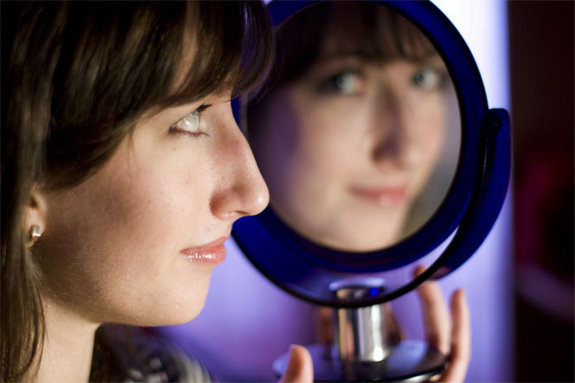How to Be Happy Without the Perfect Female Body

Being thin and beautiful doesn't sound like cause for concern, but that ideal can lead young women to be highly dissatisfied with their bodies, something that can bring about unhealthy behaviors. Now, researchers have found that certain factors, including family support and stress-busting strategies, can act as a buffer against such pressures.
The research is based on a theoretical model suggesting certain factors can boost well-being and, in turn, lead to a healthy body image. The researchers, including Shannon Snapp of the University of Arizona, wanted to test out the model.
Snapp and her colleagues decided to focus their test on college students, a group likely to experience self-consciousness about appearance, they said.
Past research has shown between 25 percent and 40 percent of U.S. college students experience negative body image and eating problems "that often include extreme worries about body image, excessive weight management strategies, and out-of-control eating episodes," write the study researchers this week in the journal Sex Roles.
They surveyed 301 first-year college women, ages 17 to 23, from two U.S. universities. To gauge body satisfaction (or dissatisfaction), the researchers had participants rate their agreement (from never to always) of positively and negatively worded statements, such as: "I like what I see when I look in the mirror" and "There are lots of things I'd change about my looks if I could." [5 Myths About Women's Bodies]
Other questions include those to measure family support, pressure from family, friends, romantic partners and the media to look a certain way, and the desire to be successful in multiple roles (called the superwoman scale), such as career woman, parent, spouse, community member and someone who is attractive.
Results showed participants with high levels of family support and low levels of outside pressure to achieve the thin ideal had a more positive body image than others. The superwoman ideal was also linked to body image, but only moderately so, with women who had a positive body image more likely to reject the need to succeed in several roles, the researchers said.
Sign up for the Live Science daily newsletter now
Get the world’s most fascinating discoveries delivered straight to your inbox.
Women who were armed with skills to deal with stress also showed a positive body image. "When women use active coping skills, they attempt to solve the problem rather than avoiding it, learn to think about it differently, and to process emotions related to the event," they write.
If women avoid dealing with stress, the researchers noted, "this might lead to maladaptive eating practices such as binge eating or over-exercising as methods for coping instead of taking active steps to cope with stressful situations."
To help young women at risk of eating disorders and negative body image, the researchers suggest that prevention programs include ways to make them become comfortable with the multiple and often contradictory expectations placed on them. In addition, they suggest:
- Teaching them to use effective coping skills to deal with stress.
- Helping them gain a positive view of their physical selves through exercise and healthy life style.
- Promoting holistic well-being and balance in their lives.
"It is particularly important for women to develop a sense of self-worth that is not solely based on appearance, and to build resilience to pressures they may receive from family, friends and the media," they write.
Follow LiveScience for the latest in science news and discoveries on Twitter @livescience and on Facebook.
Jeanna Bryner is managing editor of Scientific American. Previously she was editor in chief of Live Science and, prior to that, an editor at Scholastic's Science World magazine. Bryner has an English degree from Salisbury University, a master's degree in biogeochemistry and environmental sciences from the University of Maryland and a graduate science journalism degree from New York University. She has worked as a biologist in Florida, where she monitored wetlands and did field surveys for endangered species, including the gorgeous Florida Scrub Jay. She also received an ocean sciences journalism fellowship from the Woods Hole Oceanographic Institution. She is a firm believer that science is for everyone and that just about everything can be viewed through the lens of science.









